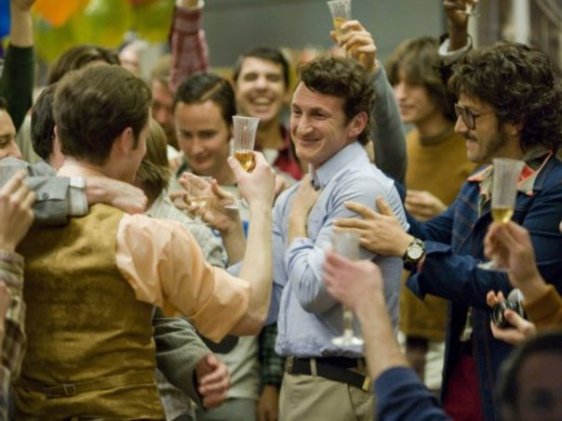
Spoiler Warning: This film is based on true events, and as such, this review will contain more spoilers than usual.
Oh, what can I really say about this film? Clint Eastwood has spun me the inspiring and true story of Nelson Mandela (Morgan Freeman) and his leadership of the newly post-apartheid South Africa. How he asked the leader of the national rugby team, Francois Pienaar (Matt Damon), to lead his team to victory in the Rugby World Cup in order to unite the nation. How Pienaar and his team rose to the great leader’s challenge, and went on to an underdog victory against the highly rated New Zealand All Blacks. He has shown me all of this, and yet he has also shown me how saccharine, overlong, and utterly unsubstantial a film can be made of it.
While Eastwood has continued to show his prowess as a filmmaker in recent years, he has never been one for subtlety (as shown by his last treatment of racial issues, Gran Torino). But while Invictus is at least a pleasant-looking and well-composed film, there’s really not much else to it. And because of its grand scope and drawn-out runtime, the film just plays out like an endless cavalcade of missed opportunities.
It could have been a film about rugby, but it wasn’t. Apart from some convincing physicality and camaraderie by Damon and company, the players don’t do much to differentiate themselves, and we really don’t learn anything about their strategy or gameplay. Likewise, it could have been a film about South African politics, but to hear this movie tell it, the only two issues facing the country are race and rugby (the latter being the solution to the former). A dark and unintentionally funny moment ensues when Mandela assures his adviser that if they sort out rugby, then they will be free to sort out “the rest” (e.g. the failing economy). Riiiight…
But rather than focus on sports or politics, Invictus tries to be a film about both, and still fails to evoke any interest. Mandela’s support for the team is largely a political maneuver, and his advisers challenge him several times on this point. But even this mildly interesting aspect of the story proves fruitless for two reasons. First, Mandela’s political shenanigans are completely pure-hearted. And second, his strategy for ensuring the rugby team a win appears to consist of interrupting every one of their practices to shake their hands and tell them how much their country is counting on them. On the eve of the quarter final match, as the team feverishly practices, another hilarious moment ensues when Mandela swoops over them with a helicopter, landing in the middle of the pitch, then assuring them that he doesn’t want to interrupt their practice. But hey, they gave him a team hat. So it’s all good.

I’m going to interrupt my rant here and say… I really wanted to like this film, and there are a few things to like in it. Morgan Freeman absolutely looks and sounds the part, and let’s be honest…he could play this part in his sleep, and of course he does a fantastic job. Matt Damon clearly bulked up and trained like a madman for this role, and continues to prove himself one of the finest and hardest working actors in Hollywood. In addition, Tony Kgoroge gives a fine performance as one of Mandela’s bodyguards (who ultimately gets a more interesting arc than Damon’s character). And how can I argue with the events? This was a great and inspiring moment in both sporting and South African history, and I wish I could have been fortunate enough to see it in person.
But instead, what I’m presented with is an expensive imitation, and it plays more like a parody of inspiring films than a genuinely inspiring one. At the game’s end, we see a montage of celebrations, as blacks and whites the country over embrace each other in the newfound (and instantaneous) harmony of the Rainbow Nation. One particularly incredible sequence involved a pair of white police officers and a small black boy who hangs out near their car in order to listen to the game on their radio… While he is understandably wary of getting billy clubbed early on, the cops eventually let him stick around. But at the end of the game, the scene just goes too far. The officers hug him (okay!), hoist him into the air (less likely, but okay!), and finally put a police hat on his head (sorry, but I just don’t buy it).
Most of the later scenes play in this way, and as a member of the audience, I just felt manipulated. In another semi-plausible sequence, the rugby team visits Robben Island and is awed by the site where their president was wrongfully imprisoned for 27 years. But once again, the film takes it too far. Pienaar locks himself in Mandela’s former cell, and several apparitions of Morgan Freeman fade variably into view… Sitting in the cell…lying in the cell…reading poetry…Chopping rocks outside… Chopping rocks…in another part of outside…
And again, I have to concede that if I were really on Robben Island, I might well have a similar reaction. But this film attempts to convince us of an intensely personal moment for Pienaar, based on a relationship between him and Mandela that is not particularly well fleshed out.
For a historical tale to be inspiring, we need a little distance from it. We need perspective. We need some sense that the inspiring effect has lasted. Fictional films like Remember the Titans work precisely because of their confined scale and believable effect. At the end of that film, I can really believe that a small town’s racial tensions could be resolved by the intense interracial brotherhood that develops amongst a high school football team.
But stories like this work in fiction precisely because we have to take the filmmaker’s word on the story’s end. I would do South Africa a disservice to discount the impact of this great man and glorious moment for their nation, but as I watch South African politics a decade and a half later – the crime, the violence, the economic strife…the corruption and leadership struggles between Thabo Mbeki – Mandela’s successor – and Jacob Zuma – another former political prisoner of Robben Island… I’m reminded that history encompasses much more than just great moments and great men.
The story goes on. And a simple and languidly paced freeze-frame of a single shining moment of that story just doesn’t inspire me.
FilmWonk rating: 4 out of 10










